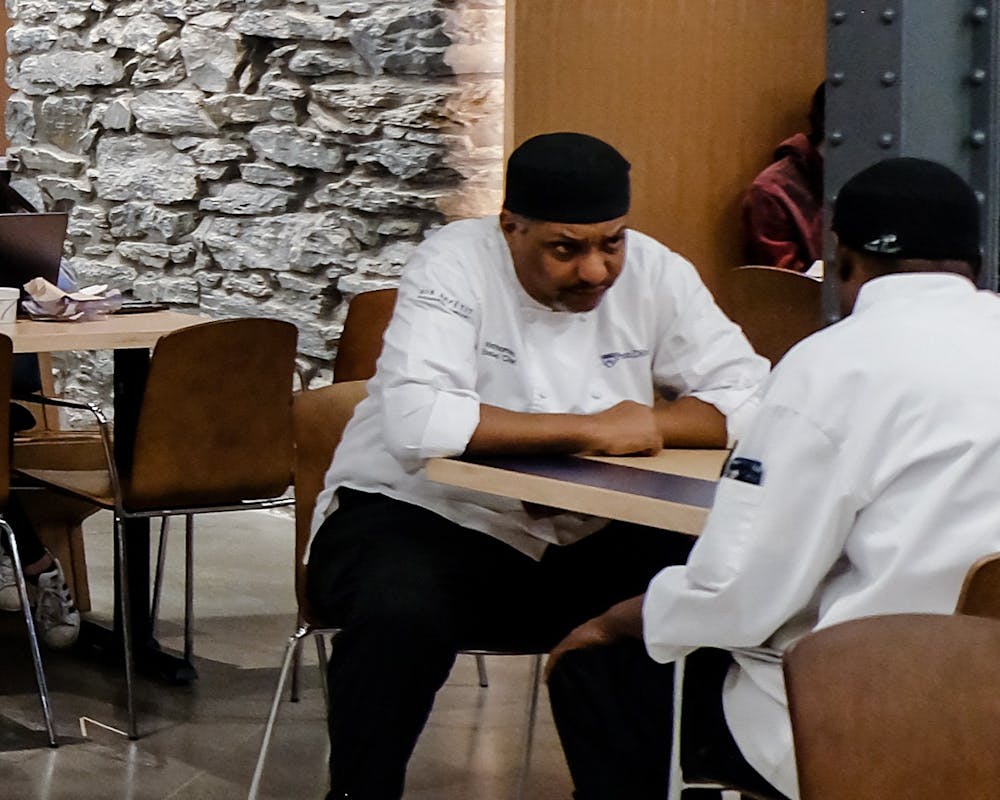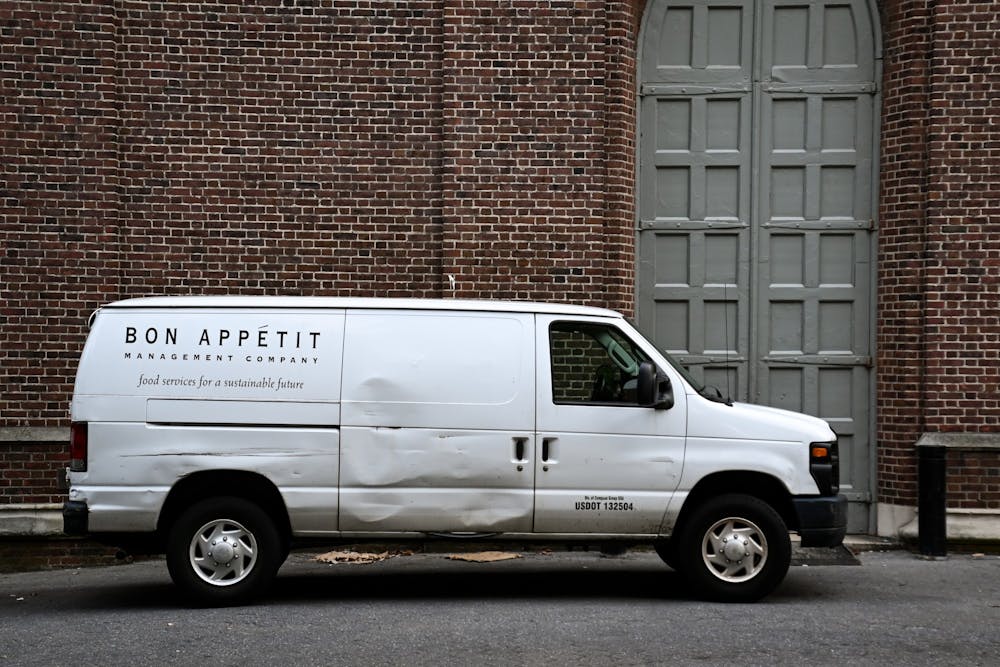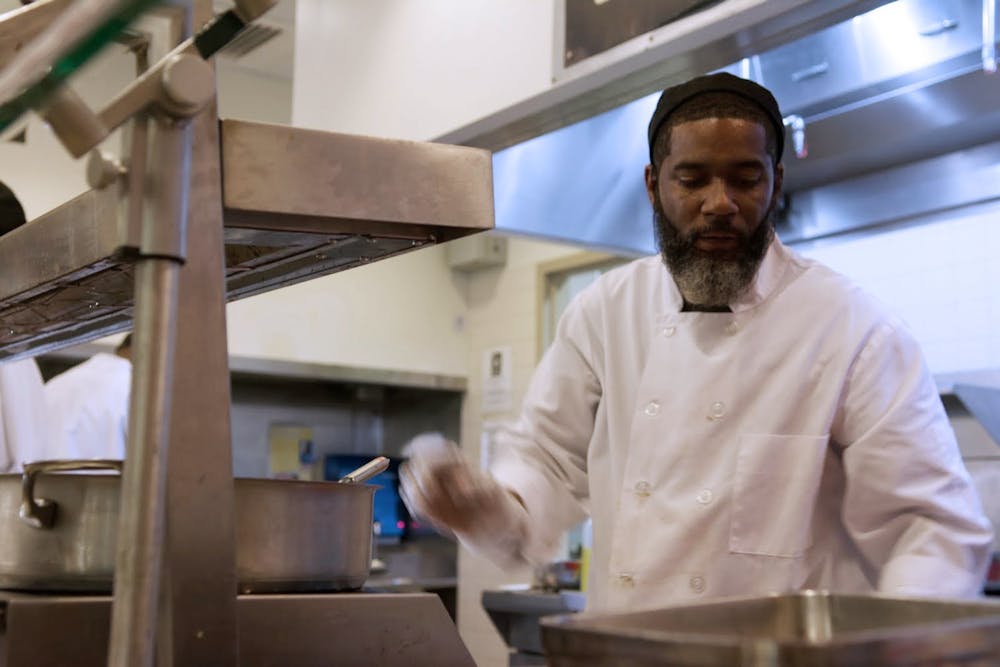
Penn will not pay Bon Appétit Management Company dining staff — all of whom are furloughed — for the fall semester, leaving over 100 workers without a steady income and forcing some to file for unemployment.
Penn’s refusal to pay Bon Appétit dining workers, which include those who staff retail dining locations and Falk Dining Commons, mirrors its initial plan to lay off an approximately 140-person staff without pay earlier this spring. Following sweeping student opposition, including a petition that garnered over 8,000 signatures, Penn agreed to pay the workers through May 15.
This time, however, Penn will only cover “the employer and employee portion of benefits up until the beginning of the 2021 spring semester” for Bon Appétit employees who receive benefits, according to an email from Penn Business Services Director of Communications and External Relations Barbara Lea-Kruger to The Daily Pennsylvanian.
Yet many employees, who profess that they were living paycheck-to-paycheck before the start of the pandemic, say that Penn’s gesture of covering benefits, such as medical or health benefit plans, is an empty one. Without a steady income or a salary, many workers can barely afford to support themselves or their families.
“I’m out here trying to survive, trying to do the best I can, trying to stay alive everyday," a Falk Dining Commons worker of 18 years said about their loss of a steady income.
Some dining workers have requested anonymity due to concerns of retaliation from Penn and Bon Appétit.
Many workers said Bon Appétit’s alleged inability to communicate terms of employment to them is proof of how little they are valued. Of all five workers who spoke to the DP, not a single one learned of their furlough without pay from their employer. Instead, they were left to find out that they would not be paid through news broadcasts like Fox 29 News Philadelphia or word-of-mouth.
"When we all got laid off and were supposed to return back to work [this fall], they didn't even call us to tell us that we wouldn't be working," one dining worker said. "We had to find out from other sources, like a worker might be watching the news and we turn to the news and then we find out."
Some veteran dining workers said that when they were laid off earlier this spring, Penn gave them food bank vouchers, unveiling just how little job security they really have.
One Falk Dining Commons worker of 11 years said that receiving a food bank voucher from a company they have worked over a decade for was both shocking and degrading.
“I spent more time with this job than my own children," the Falk Dining worker said. "I have an older son that I barely was able to raise, because I was working and not taking days off and dedicated myself to my job."

Over 100 workers staff Penn's retail dining locations and Falk Dining Commons under Bon Appétit Management Company.
The furloughed employee, who is getting paid $300 a week in unemployment with a $1,600 rent each month, added that they are left with no choice but to search for different employment opportunities.
“I'm actually filling out other applications for other companies to try to make sure that my family is not going to be put out on the street,” the Falk Dining worker said.
Since March, approximately 20 Bon Appétit dining workers have left their positions in search of paid work.
Another Falk Dining worker, who has been working at the dining hall for 15 years, added that receiving a food bank voucher from a university with a $14.7 billion endowment was especially heartbreaking and demonstrated just how expendable the dining staff really are even at one of the wealthiest institutions in the country.
“For me to get told when I got laid off last [spring], 'Here's a paper that has a list of food banks on it. I hope everything works out for you,' was really insulting, especially when I work at a university which I know is worth millions upon billions," a dining worker said.
Assistant Professor of Legal Studies & Business Ethics Brian Berkey said that there is a strong case for Penn to intervene on behalf of Bon Appétit staff, citing ways to reallocate resources at the administrative level to accommodate vulnerable workers, such as cutting executive pay like President Gutmann's $3.9 million salary.
"Penn is a very wealthy university, so when deciding what ought to be prioritized, there are good reasons to think that continuing to provide compensation for the lower paid employees should be toward the top of the list of priorities," Berkey said.
While Bon Appétit workers will not receive pay this semester, the 113 dining workers directly employed by Penn are not furloughed and will continue to be paid for their typical 40-hour work week, Lea-Kruger wrote.
The only campus dining facilities open are 1920 Commons, Starbucks at Commons, and Gourmet Grocer, according to her email.
Students and advocacy groups such as the Student Labor Action Project have previously called on the University to reconsider subcontracting over half of its dining workers through Bon Appétit.
While many Bon Appétit workers are paid under $25 per hour, all five Bon Appétit workers the DP spoke with insisted that dining staff employed by Penn make more money despite working similar jobs. Bon Appétit staff also do not receive a college fund with tax benefits or tuition benefits for their children, both of which are included in Penn Dining staff's benefits.
Some veteran workers for Bon Appétit have considered leaving Bon Appétit to work directly for Penn but said that losing their seniority, which is associated with more pay, is a major deterrent.

Shop steward of Teamsters Local 929, the union that represents Penn retail dining workers, and Falk Dining Commons chef Troy Harris said Penn and Bon Appétit workers should receive the same benefits and pay, as they all wear the same uniform and perform the same jobs.
“We walk around with the Penn logo every day and we serve the kids with a smile and treat people how they want to be treated in my dining hall because respect comes first,” Harris said. “Why can't we, why can't our families, reap the benefits of working under an Ivy League school?”
Penn is not the only institution where subcontracted dining workers fall outside of the scope of university protections and are, in many cases, exploited. At Northwestern University, which subcontracts its dining workers through Compass Group, approximately 100 employees were laid off without pay or health insurance this fall. Other universities, such as Harvard, Stanford, and the University of Virginia, also subcontract many of their dining workers.
Many Falk Dining Commons employees felt that even when they worked on campus, they were never properly compensated by Bon Appétit for their work, which they said can be more demanding than that of the average Penn-employed dining worker. Unlike other dining halls, Falk Dining is a Kosher facility where workers have to abide by certain restrictions, such as having to cook food from scratch, ensuring that meat does not touch dairy, serving food in separate kitchens, and working late for Friday night Shabbat dinners, according to multiple Falk dining staff.
Falk Dining workers expressed gratitude towards the director, other employees, and students of Penn Hillel, where Falk Dining is located, for their support during the pandemic. According to multiple Falk Dining staff, Hillel Executive Director and Campus Rabbi Mike Uram personally reached out to every worker in the building to check on how they were doing this fall. Last spring, Hillel co-presidents and College seniors Shira Silver and Sydney Lewis created a website for students to donate money to the Falk staff.
“[The Hillel community] make us feel more a part of this family than Penn or Bon Appétit does,” one dining worker said.
The worker added that during an academic theme year Penn calls the Year of Civic Engagement, Penn administrators should work to alleviate and not intensify the financial struggles that dining employees face day in and day out.
“The only thing it takes is for one person to put themselves in the shoes of the employees that work here," the dining worker said. "Maybe that would just change the way that they treat us, because I don't think any of them could survive living with what we have to live with.”
The Daily Pennsylvanian is an independent, student-run newspaper. Please consider making a donation to support the coverage that shapes the University. Your generosity ensures a future of strong journalism at Penn.
Donate







